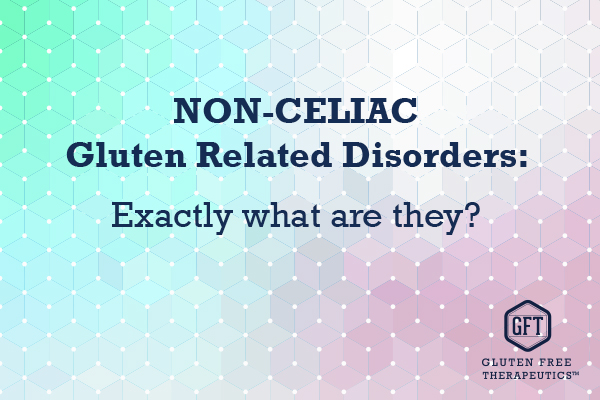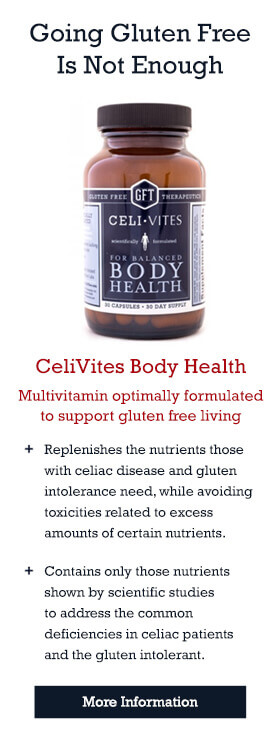
Non-Celiac Gluten Related Disorders
The fight for acceptance by the medical community
Even though celiac disease (CD) is now the subject of considerable media attention and scientific research, that wasn’t always the case; unlike some diseases that have been widely accepted for decades and even centuries, when it came time to recognize CD as a “real” disease, getting the academic “buy in” necessary to spur meaningful research was no easy task. Many doctors and researchers felt the disease itself was little more than a popular fad spurred on by media hype. But as evidence grew and clinical tests became available to accurately pinpoint the diagnosis, eventually CD was accepted as a disease that has very real – with very serious – physical consequences if left untreated. The recognition and scientific interest in CD is due in part to a greater understanding of autoimmune disorders in general, as well as an appreciation of the links between different autoimmune diseases; research has shown those with CD have a much higher chance of having at least one other autoimmune disorder, and often several.
But what about non-celiac gluten related disorders?
In more recent years, a host of other non-celiac conditions has been brought to light, conditions that still appear to be related to gluten ingestion, but which do not have the same physical consequences as CD. These gluten-related disorders have caused a lot of confusion and reignited at least some of the skepticism that once surrounded CD. 
So what are gluten-related disorders, and how do they differ from CD?
At least one study suggests gluten-related diseases and disorders can be divided into three separate entities: CD, wheat allergies and immune-mediated gluten sensitivity. The study even includes a proposed algorithm to help determine which of the three may be at play. In brief, wheat allergies are roughly defined as allergic reactions that occur in response to eating gluten, including respiratory symptoms like coughing and wheezing, skin reactions like rash or hives, and gastrointestinal sensitivity. Immune-mediated gluten sensitivity is defined as a reaction to gluten when neither allergic nor autoimmune mechanisms are involved.
Interestingly, many CD experts have been skeptical of the existence of non-celiac gluten-related disorders, which is especially ironic given the initial skepticism that surrounded CD when it was trying to gain recognition as a “real” disease
Getting diagnosed
For patients with true CD, it’s the intestinal biopsy that is the gold standard for determining once and for all that CD, and not wheat allergy or immune-mediated gluten sensitivity, is present since neither of the other two conditions causes the intestinal damage characteristic of CD.
Then what’s the bottom line? The most important thing you can do if you suspect you’re suffering from any type of gluten reaction is see a doctor for a complete evaluation and work up. While neither wheat allergies nor immune-mediated gluten sensitivity are associated with the same damaging clinical manifestations as CD, they still cause uncomfortable reactions that demand attention and treatment. And those who wind up being diagnosed with CD can benefit substantially by having the disease identified as early as possible so treatments can be taken to help minimize the damage to the bowel, reverse consequences of malnutrition such as anemia and osteoporosis, and reduce the risk of developing other autoimmune disorders.
The gluten free diet lacks important nutrients
For anyone following a gluten-free diet, getting adequate nutrition is important. While those with non-celiac gluten-related disorders may not have the absorption problems associated with CD, they still face the risks of gluten cross-contamination when buying supplements that may have been manufactured or processed in facilities that also process products with gluten. CeliVites provides an ideal solution for people with gluten-related disorders by eliminating the risk of cross-contamination. The gluten free diet is lacking important nutrients for which a well-rounded supplement can compensate. And of course, the supplements’ higher levels of bioavailability mean the nutrients are much more readily absorbed, a benefit to anyone looking to maximize the nutritional value of their supplements. Learn more about CeliVites by visiting our site.
This original article is made possible by Gluten Free Therapeutics. Our mission is to educate, inform, and provide the most effective nutritional products possible to allow those with celiac disease and serious gluten intolerances to heal their bodies. CeliVites complete line of superior gluten free supplements includes multivitamin/multimineral supplements, iron supplements, and calcium supplements for people living with celiac disease. All CeliVites products are designed to help you heal, restore and rebuild your body, because going gluten free isn’t enough!
Comments ()
















I have rheumatoid arthritis, and following a gluten free diet has cut down my number of pain attacks. My hands used to swell up every day. Since starting the gluten free diet, I’ve had ONE attack. I can play the flute for 30 minutes or more without crying my eyes out because the pain is so bad afterward. No, I don’t have Celiac Disease, but being gluten free HAS helped me.
My son was diagnosed with Rheumatoid Arthritis when he was two..they didn’t catch that he had full blown Celiac until he was 9.Even though he is completely gluten free he still has issues with his arthritis. I also have 3 other kids that tested genetically positive through blood work and my husband tested genetically positive also. He goes in for a biopsy in March because he is symptomatic.
Linda & Nicki-
I have celiac disease and inflammatory arthritis. I have had some improvement in my symptoms by using these supplements- glutamine powder, purified fish oil, turmeric/ginger extract, homemade kombucha, aloe vera juice, and probiotics. It’s worth trying if you haven’t already. You could also try going grain free, nightshade free, or on a juice fast and elimination diet. Good luck!
For those suffering with the autoimmune disorder of arthritis…my friends son has Celiac…had arthritis as a side effect…went thru over 2 years of horrible pain…my friend finally researched arthritis and bacterial infection…he is now seeing a doctor who does simple antibiotic treatments and he is off Celebrex …shots etc…pain gone!
I’m not celiac but have severe wheat sensitivity – more specifically sensitivity to modern hybridized wheat & rye. I also have SLE/RA/Sjorgren’s/Reynauds. When I gave up wheat my RA went into complete remission. I have complete use of my hands again and they no longer swell. It’s been 2 years g.f. and will never, ever go back. I nearly died from neurological and systemic issues caused by it.
I have been gluten free for 8 months now, and I have never felt better in my life!!! My fatigue is GONE! My arthritis is GONE! I will never eat bread EVER again!
My son was diagnosed with autism in 2012. I researched and researched and researched and stumbled across a study done on autistic children that followed gluten and casein intake. In short, the study showed that in children on the spectrum when gluten and casein were ingested, an opiate bi-product was found in the children’s urine–thus, meaning to child exhibiting autistic traits, gluten is like giving the child a hit of heroin. This exceptionally true in my son. We removed all gluten and casein from our diet, and coupled with prayer, speech therapy, and home therapy, my son became a totally different child. We are not financially able at this time to be gluten and casein free anymore, but we still drink almond and opt for fruits and meats. During the time we were completely GF and CF, I took my son to a gastronologist. I told him-hey look, I pretty much know that my son doesn’t have celiac disease or anything else wrong BUT listen here’s this study I read and here’s the difference I see in my son. The dr told me that no matter what anyone told me that if I could see changes in my son to keep doing what I was doing. I hope to get back to that point one day. It was time consuming and hard but it was worth it!!
Hope, please contact Better Batter. This is an awesome company that does discounted pricing for those with medical needs. They are well aware of the effect of gluten with Autism. Best wishes, keep fighting the good battle for health
Hope, you can be gluten free on a budget. I’m a single parent of two teen sons, and we all eat a gf diet because of my celiac disease. Minimally processed food (think local and fresh, or start a garden so you know what you’re putting on the table) is generally cheaper. I rarely buy gf bread (although Costco carried a large loaf of Udi’s bread for less than $4), and when I do – I freeze it. I make nearly all of our meals at home. We’ve completely changed our diet since my diagnosis, but I find that by preparing most meals from scratch, and always being mindful of buying local, we don’t spend any more than we did on groceries before the diagnosis. My niece’s daughter is autistic. She wasn’t verbal until age 5, but is doing well in school. She’s a gift. Wishing you and your family all the best.
Hope and all, We know that purchasing gluten free foods can seem more expensive. Many may not know that there is a tax deduction option if applicable to your situation. We are including this link to information on the procedure on how to deduct the cost of GF food on your taxes.
Follow this link: http://www.celiaccentral.org/shopping/tax-deduction-guide-for-gluten-free-products/
Perhaps this will help.
You can be gluten free on a budget, though it does take some budget acrobatics. I live in an expensive area and am paying off student loan debts and car loan expenses on top of my normal living expenses. I could save money not being gluten free, but then I know I would feel like crap. It’s totally worth it when it’s a medical reason. If you were just doing it for fun then there’s no problem taking a break from it because of monetary issues, but it’s worth spending the time figuring out how to do gluten free on a budget when it’s a health issue.
There are a lot of cheap, remade meals with gluten, but there are also a lot of cheap, easy-to-make-yourself meals without gluten. Rice is cheap and you can mix it with sautéed veggies and/or meats for all kinds of different options. Meat, veggies, fruits, beans, many grains, etc. are naturally gluten-free. You don’t have to buy products labeled “gluten free” that are made with special flours and are therefore more expensive if you know what to look for on the label.
You can do it, I believe in you 🙂 It’s worth it if it helps with health. You only have one body and one life so making it a priority just makes sense.
I was diagnosed with a Gluten sensitivity in my 40’s. When I would ingest gluten I would get stomach cramps and diarrhea within 15 minutes. Then feel like someone used mu stomach as a punching bag for 12 hours. Recently I found I can eat non GMO wheat and at worse only suffer from gas. I cried when I went in to Trader Joes the first 5 times because they carry almost all non GMO products. Only once in 3 years have I had a bad reaction. Now I can go to organic restaurants and even most of Europe and eat whatever I want. Ban GMO’s in the US. Don’t buy them. Buy organic.
Systematic Shin Splints develop every time I consume Gluten. Stay away and I am fine. Shin pain is so bad that mere moving out of bed for the bathroom is pure torture. Been praying for a group to do a study for people who’s lives are better because of Gluten Free diet but test negative for Celiac Disease and Allergy. Please, if you hear of something will you let me know? Thanks.
My son use to get terrible shin pain for years…Was constantly being told he had “growing pains”…I knew there was more to it then that. When he was 9 finally had blood work done that showed he was reacting to gluten (Celiac negative though)…took him off of gluten and his leg pain vanished
I have shin pain all the time,and never related it to c.d. Thank you
Have been GF and dairy free for 7 yrs and it totally changed my health issues. No more muscle/joint pain, fatigue gone, energy back, no more coughing, fingernails strong. Had issues since a teen and not diagnosed until age 60. Not necessarily more expensive, just more selective shopping. Thanks to Trader Joe’s for carrying many GF and dairy alternative products. Very few restaurants provide a GF menu of substance, but Ruby’s has GF buns. For someone who loves to cook, it was a challenge, but there are healthier options when cooking GF once your pantry is stocked w/the necessities. Bob’s RED MILL baking products provide a great selection. Hang in there, it’s worth it.
I get a very odd reaction from eating a couple of different processed cold cereals with milk. I feel like the roof of my mouth, especially towards the back in the soft palate, suddenly develops a rash that feels sore. The last time it felt like it was burning so bad that I had to spit it out and didn’t finish eating the bowl of cereal. I don’t think this happens with anything else that I eat. But maybe it did happen with a roll I ate. I am almost 60 years old. My mother,a sister, and a brother all have celiac disese. Do you think this is related to a wheat or gluten type of reaction? I have never heard of this happening to anyone else before. Thanks.
Hi Debbie..I have gotten this about 3 yrs ago now..I ate some fruit and the roof of my mouth was on fire..was crazy..I just don’t eat fruit anymore..I am GF…I can’t imagine I am allergic to all fruit..I am thinking all this has to do with pesticides on the fruit..altho I do buy or did buy organic..so that theory is gone..Lhynn
I was diagnosed with Irritable Bowel Syndrome for years. My 2 male cousins have both been diagnosed CD.We were talking about different aspects of CD and many of my symptoms fit. I purchased a cookbook for CD. in this cookbook was a list of symptoms that i was very familiar with. i took my book and went to see my Gastroenterologist. He agreed and since i had not started the CD diet was able todo the blood test. As soon asthe blood was drawn he toldme to start the diet immediately, so I did. i am not CD but am intolerant of Gluten. i could not believe how bloated i felt until that bloat was gone. Sjorgrens was another diagnosis i knew nothing about until it went away. lf i eat a slice of any type of regular bread or piece of cake even though very small amount i feel terrible and I might as well have eaten cement because that is what it does to my system. The process of elimination STOPS. I would have to spend several days, possibly a week to 10 days on Myrlax. i have learned it just isnt worth the pain and suffering if i consume food off of a GF diet. I am very thankful that i feel so much better!
I always see things that say that if it’s not Celiac, it’s not as damaging. This is not true. It took me 6 years and two year-long major depressions to discover on my own (while doctors were trying to get me to do all sorts of things that I knew would kill me)that I absolutely cannot eat wheat. This insensitivity is so severe that all I have to do is eat some donuts or bread for about two weeks, and I will suffer a prolonged and major depression for a full year *regardless* of whether I stop eating wheat. I don’t know how I survived those depressions, but they are so bad that I don’t think I could survive a third go round. Celiacs is *not* necessarily the worst of all gluten intolerance, and I have tried to get help from doctors who, for whatever asinine reason, refuse to accept the possibility that food may cause depression. I guess there’s no money to be made in a diagnosis like that.
I experienced withdrawl symptoms when going off gluten. Shakes for 3 days.
The most amazing thing is when the process was over, my depression was gone. Just gone. I’ve had it from as early as I can remember.
I also have Lupus, but it is in remission.
Anybody else experience this?
I had been suffering with hip, leg pain and a rash on my arms for years. I’ve had X-rays, MRI’s, cortisone shots, all kinds of medications. I’ve been told I had arthritis, IBS, fibromyalgia, and so many other diseases. I decided to stop eating wheat and start eating a gluten free diet. I no longer have that aching pain all over my body and the diarrhea is no longer a problem. Stomach cramps are also a no show and the inflammation is also gone. If I eat a small amount of wheat it all erupts and when I eat gluten foods my stomach goes back to the IBS symptoms. I know it has become a joke to so many but I know for a fact that this works for me.
These symptoms may also be associated with FODMAPs. See: http://www.gesa.org.au/consumer.asp?id=190
I have a cluster of 7 symptoms I can turn on and off depending on whether I eat gluten or not. They are: IBS, gall bladder pain, facial inflammation resembling rosacea, rough/irritated skin particularly on the upper arms, joint pain, sinusitis, and migraine-type headaches. I have a first cousin who has celiac disease, but my symptoms do not seem as life-threatening as hers. I have been eating a gluten-free diet since 2009, with a marked improvement in my overall health.
I was diagnosed 10 years ago, and STILL occasionally get a reaction from gluten due to cross contamination..But the important thing is that you don’t need to buy the expensive food and supplements..eats veggies, fruits and meat w/o gluten, fish, poultry..Just read labels, or go on the search engine for everything that’s gluten free before you go grocery shopping.
It thee anyone out there with information about gluten and anger/emotional management issues? I know that there is no autism, ADHD or CD. Currently we see a nutritionist and have cut out gluten for the last 3 years. Once a year or so we try to reintroduce with no success. When we are gluten free my son can control his anger, discuss difficult emotions and is generally pleasant and cooperative. When we are on gluten he has angry outbursts, gets physical with other children and can’t process emotions like frustration or joy without being out of control and overwhelmed. I have done a tom of research and can find NOTHING that sounds like this so we pay for alternative medicine and gf products out of pocket. This is not just in my head but I am out of resources. Thoughts?